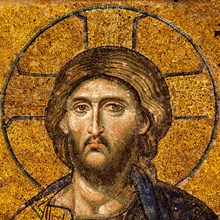Unless we clearly understand Christ and his mission, we miss the core of Christianity. The center of the gospel is Jesus Christ. But what does that mean? This group of studies hopes to help answer that question.
Session One
Restoring Our Vision of God
Jesus enables us to see God not as a stern taskmaster but as our loving Father.
Evangelicals are good at explaining how our sin separates us from a holy God. "I was raised to understand that sin's gravest consequence is the way it forces God to perceive me: God is holy, I'm not, and there's no way he can even look at me until I have the covering of Christ's blood," Carolyn Arends writes in her column, "Our Divine Distortion." Arends continues: "In my teens, I clipped a poem out of a youth magazine in which the poet asks—and answers—a pressing question: 'How can a righteous God look at me, a sinner, and see a precious child? Simple: The Son gets in his eyes.'" This is good theology, but incomplete. We need to also get a good dose of biblical anthropology so that we may grasp how sin warps our perceptions, not just of ourselves, but of God himself.
Session Two
God of Power, God of Love
God demonstrates his power in strength and in weakness.
Who is God? Sometimes our conceptions of God fall into one of two unfortunate but common stereotypes. Is he the commanding God of the Old Testament or the forgiving God of the New Testament? Is he the submissive Jesus of Good Friday or the triumphant Jesus of Easter Sunday? We all desire God's power in our lives, but our understanding of his power often neglects the paradoxes of Scripture. We need to understand how he is omnipotent in both strength and weakness.
Session Three
The Uniqueness of Jesus
Jesus called himself the Way, the Truth, and the Life for a reason.
In the 1977 movie Oh, God! Jerry Landers, the assistant manager of a grocery store, asks God (played by George Burns) whether Jesus is his son. God/Burns says, "Yes"—then adds that Muhammad, Buddha, and others are also his children. In other words, Jesus is neither more nor less special than anyone else. While this approach wins plaudits in our pluralistic times, it runs counter to the witness of Scripture and the words of Jesus, who said, "I am the way and the truth and the life. No one comes to the Father except through me" (John 14:6). So are we going to believe a comedian or Jesus? And if we are going to believe Jesus, what difference does his uniqueness make for our faith?
Session Four
The Jesus We'll Never Know
The quest for the Historical Jesus has failed. But our faith is founded on something deeper.
Mark 4:35-41; 8:27-38; 9:1-8; Acts 9:1-19
In the Christianity Today article "The Jesus We'll Never Know," author Scot McKnight points out that we all tend to remake Jesus in our own image. New Testament scholar McKnight gives students in his classes a standardized psychological test. "The results are nothing short of astounding," he says. "The first part is about Jesus. It asks students to imagine Jesus' personality, with questions such as, 'Does he prefer to go his own way rather than act by the rules?' and 'Is he a worrier?' The second part asks the same questions of the students, but instead of 'Is he a worrier?' it asks, 'Are you a worrier?' The test is not about right or wrong answers, nor is it designed to help students understand Jesus. Instead, if given to enough people, the test will reveal that we all think Jesus is like us." Much of the recent Jesus scholarship, McKnight insists, reveals more about the scholars who promulgate it than it does the central figure of the New Testament.
Session Five
The Gospel Defined
It's not about what we can do for Jesus, or what he can do for us, but what he has already done.
Romans 1:14-17; 1 Corinthians 1:18-25; 15:1-11; Galatians 3:1-11
The gospel of moralistic therapeutic deism is running rampant in the church. In an interview with Mark Galli, theologian Michael Horton says we are tempted to live a Christless Christianity because we are human-centered rather than God-centered. Conservative-leaning believers say, "These are God's commandments. The culture is slipping away from us. We have to recover it, and you play a role." Meanwhile, others say, "You can be happier if you follow God's principles." But as good as following these imperatives might be, the gospel is not a matter of doing the right things or trying harder. Horton says, "The gospel isn't 'Follow Jesus' example' or 'Transform your life' or 'How to raise good children.' The gospel is: Jesus Christ came to save sinners—even bad parents, even lousy followers of Jesus, which we all are on our best days."
Total number of pages - 58





